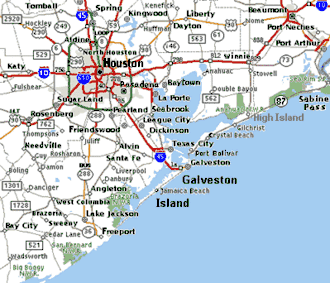Brazoria National Wildlife Refuge
The Brazoria National Wildlife Refuge is a 44,414-acre (179.74 km2)[1] wildlife conservation area along the coast of Texas (USA), east of the towns of Angleton and Lake Jackson, Texas. It borders Christmas Bay and the Intracoastal Waterway, separated from the Gulf of Mexico by Follet's Island.

| Brazoria National Wildlife Refuge | |
|---|---|
IUCN category IV (habitat/species management area) | |
 Map of the United States | |
| Location | Brazoria County, Texas, United States |
| Nearest city | Angleton, Texas |
| Coordinates | 29°05′00″N 95°15′00″W |
| Area | 44,414 acres (179.74 km2) |
| Established | 1969 |
| Governing body | U.S. Fish and Wildlife Service |
| Website | Brazoria National Wildlife Refuge |
Brazoria National Wildlife Refuge was established in 1969 and provides quality habitat for wintering migratory waterfowl and other bird life. The refuge contains a freshwater slough which winds through salt marshes.[2]
In winter, more than 100,000 snow geese, Canada geese, pintail, northern shoveler, teal, gadwall, American wigeon, mottled ducks, and sandhill cranes fill the numerous ponds and sloughs to capacity.[2]
In summer, birds which nest on the refuge include 10 species of herons and egrets, white ibis, roseate spoonbill, mottled duck, white-tailed kite, clapper rail, horned lark, seaside sparrow, black skimmer, and scissor-tailed flycatcher.[2]
Three national wildlife refuges on the Texas coast - Brazoria, San Bernard and Big Boggy - form a vital complex of coastal wetlands harboring more than 300 bird species.[3]
%252C_Brazoria_National_Wildlife_Refuge%252C_Brazoria_County%252C_Texas%252C_USA_(24_August_2013).jpg.webp)
Notes
- "Annual Report of Lands Under Control of the U.S. Fish and Wildlife Service" (PDF). www.fws.gov. U.S. Fish and Wildlife Service. September 30, 2010. Retrieved December 14, 2011.
- FWS (September 2008). "Brazoria Refuge". FWS.gov. Retrieved 2008-09-20.
- FWS (September 2008). "San Bernard National Wildlife Refuge". FWS.gov. Retrieved 2008-09-20.
References
- FWS (September 2008). "Brazoria Refuge". FWS.gov. Retrieved 2008-09-20.
![]() This article incorporates public domain material from websites or documents of the United States Fish and Wildlife Service.
This article incorporates public domain material from websites or documents of the United States Fish and Wildlife Service.